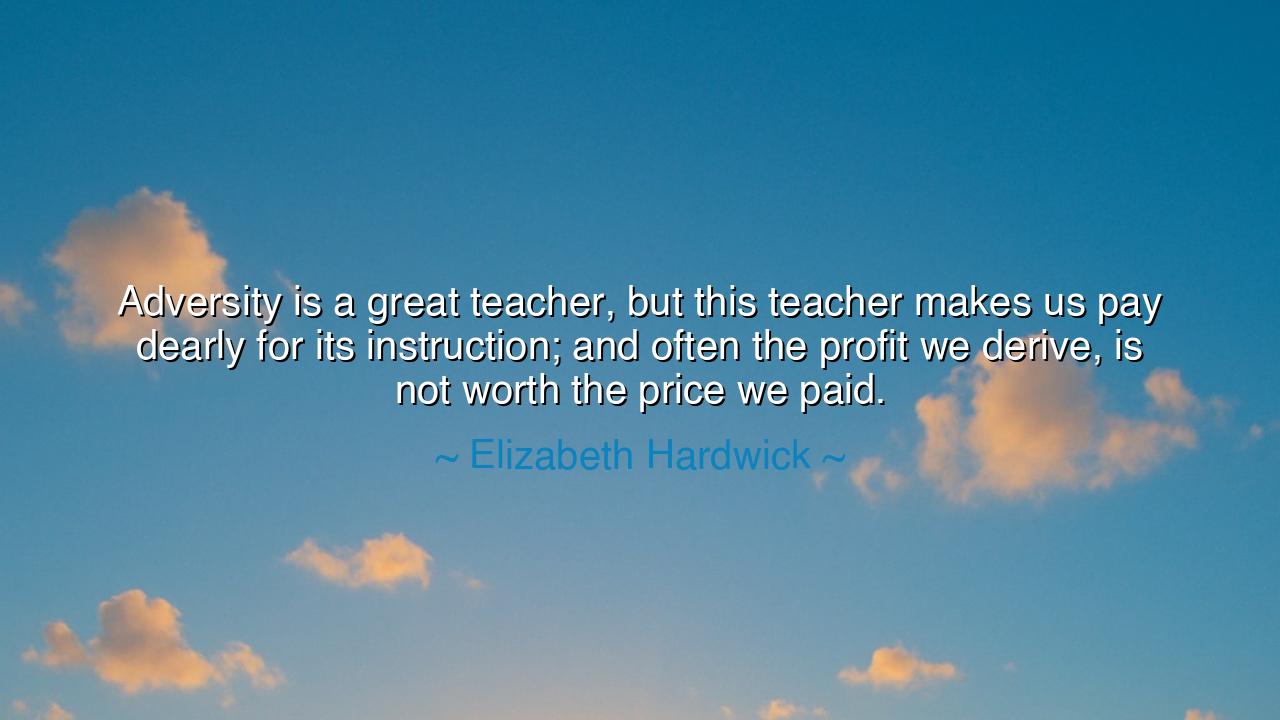
Adversity is a great teacher, but this teacher makes us pay
Adversity is a great teacher, but this teacher makes us pay dearly for its instruction; and often the profit we derive, is not worth the price we paid.






Hear, O seekers of wisdom, the voice of Elizabeth Hardwick, who spoke with clarity of the bitter truth: “Adversity is a great teacher, but this teacher makes us pay dearly for its instruction; and often the profit we derive, is not worth the price we paid.” By these words she unveiled a paradox most solemn. For though suffering carves wisdom into the soul, its lessons are bought with anguish, loss, and scars that may never fade. Adversity instructs with fire, yet the cost of its fire may consume more than it enlightens.
Mark well the meaning: men and women often glorify suffering, declaring that pain makes one strong, that trials temper the spirit as iron is tempered in flame. Yet Hardwick bids us remember that the furnace is merciless, and many who enter its heat are not made strong, but broken. Adversity, though it teaches, does not teach with kindness. Its tuition is exacted in tears, in grief, in years lost that cannot be reclaimed. Therefore, while we must honor the lessons hardship yields, we must also tremble at the ruin it may bring.
Reflect, then, upon the story of Job, that ancient sufferer of the Scriptures. His fields were stripped, his children taken, his health consumed, his friends false, his nights filled with lament. And though he emerged with a wisdom deep and profound, was the price not grievous? Was the knowledge of endurance and faith worth the ashes of his joy? This is the essence of Hardwick’s truth—that some wisdom comes so blood-soaked, so sorrow-filled, that its worth is forever clouded by the agony through which it was purchased.
History bears further witness. Consider the millions who endured the torment of the Great War, where the youth of nations were cast into trenches of mud and fire. The world indeed learned lessons—about the cruelty of unchecked ambition, about the need for peace and the futility of war. Yet who shall say that such wisdom was worth the rivers of blood, the shattered bodies, the broken families left behind? Here again the teacher Adversity took its fee, and the tuition was a generation’s ruin.
But let none mistake this truth as counsel to flee all hardship. No life can escape trial, and no soul can avoid every shadow. What Hardwick reveals is balance: do not rush to praise suffering as though it were always noble. Seek instead to learn wisdom also in peace, to find growth in discipline, in study, in compassion, in the listening ear, and in the patient heart. For though Adversity teaches, there are gentler masters whose instruction does not leave us maimed.
The lesson, then, for you, children of tomorrow, is clear: do not go seeking pain as though it were the only path to greatness. Rather, prepare your soul so that when hardship comes unbidden, you may take from it the wisdom without letting it consume you. Cultivate patience now, discipline now, compassion now, so that when the storm rises, you are not destroyed, but anchored. And when the teacher of suffering comes, take the lesson swiftly, but do not glorify the fire that burned you.
Therefore, live wisely: embrace learning in peace, cherish the wisdom of others, and build the strength of mind and body before trials fall upon you. Let your growth not always require ruin; let your ascent not always demand blood. And when hardship does strike, let the memory of Hardwick’s words guard you, reminding you that though Adversity may shape you, it is not the only sculptor of the soul.
So I leave you with this command: honor the lessons of suffering, but do not worship them. Take what is given, but do not bow to the flame. Seek wisdom in every season, not only in sorrow, and your life shall be richer, your soul more balanced, your path more enduring. For the greatest strength is not forged only in fire, but also in light.






AAdministratorAdministrator
Welcome, honored guests. Please leave a comment, we will respond soon